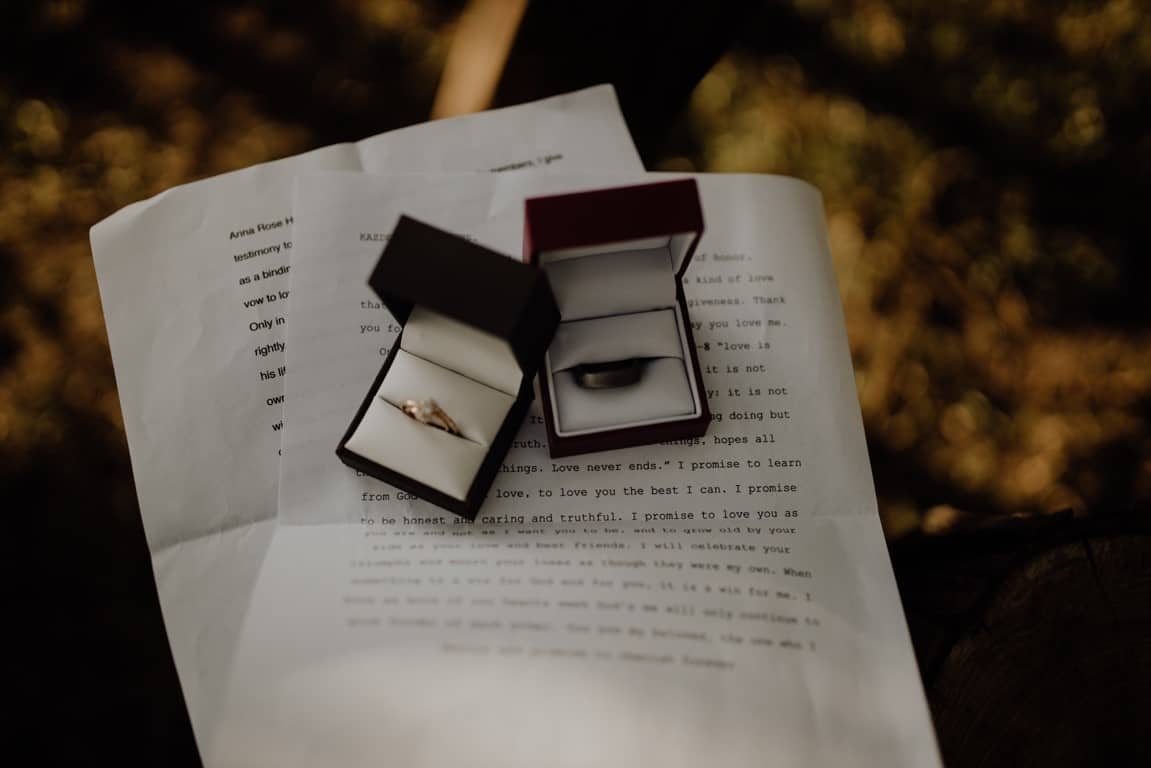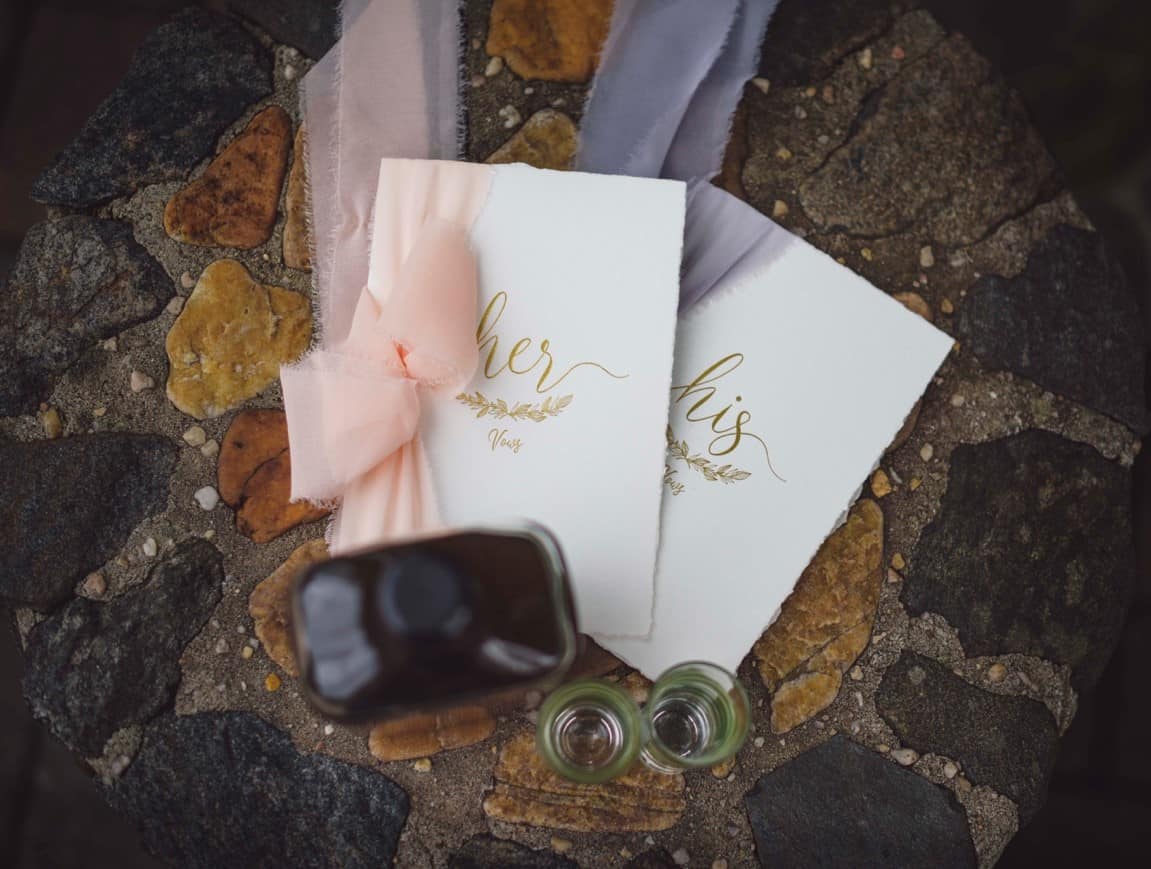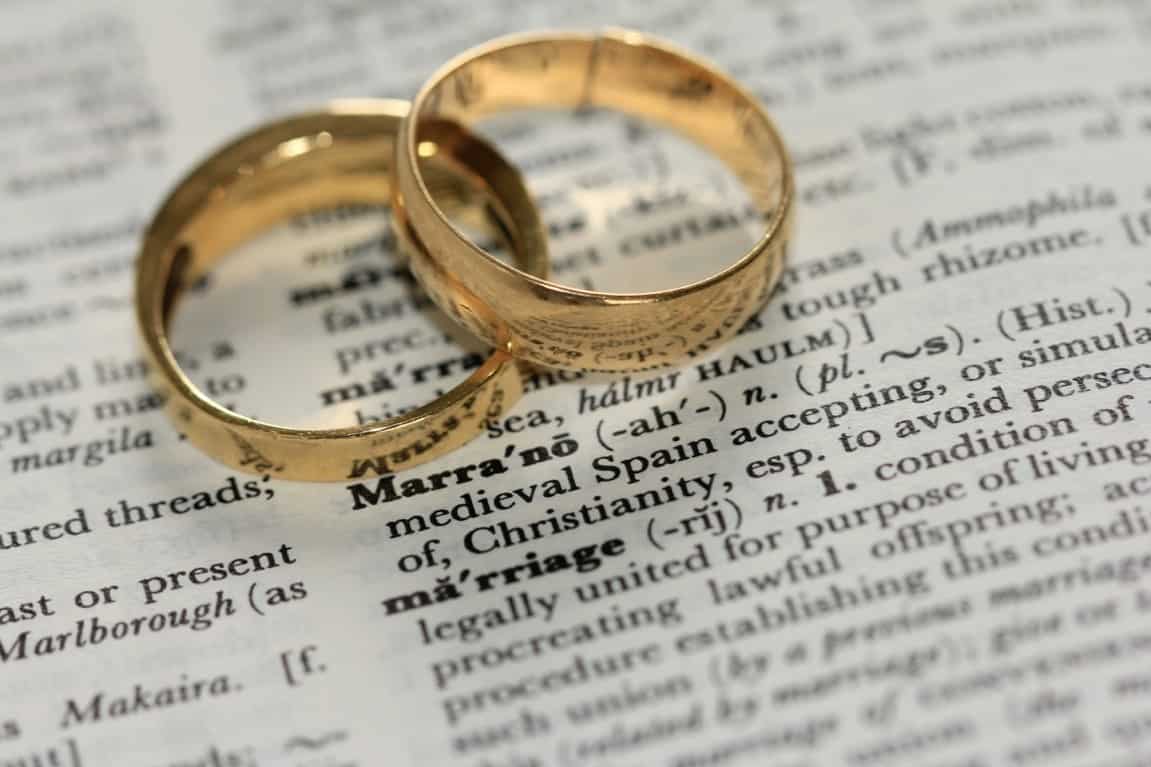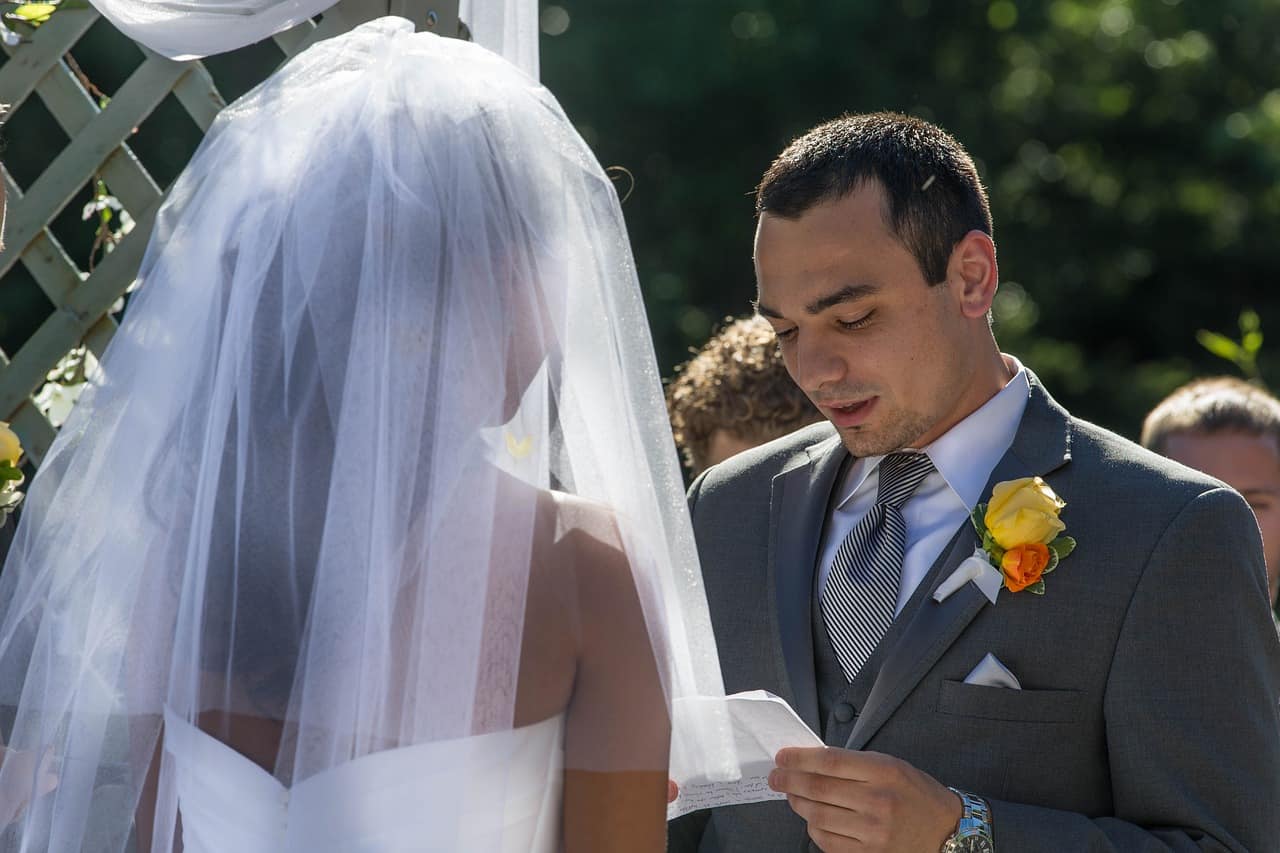When crafting wedding vows, many find themselves immersed in the emotion and significance of the moment, leading to extensive writings. It’s not uncommon to realize that the heartfelt draft might span several pages. Given this, the wedding vow length becomes a pivotal concern for many, especially as the optimal length of vows isn’t always clear to everyone.
How long should wedding vows be? Typically, wedding vows range from one to two minutes, translating to about 150 to 300 words. This ensures the vows are concise enough to hold the audience’s attention, yet lengthy enough to convey personal sentiments. It’s also crucial to remember that vows are just one component of the entire ceremony.
Below, you’ll find guidelines to help you shape your vows, complete with example structures. We’ll also address other common inquiries related to wedding vows, ensuring your words resonate deeply while fitting smoothly into the ceremony’s flow.
Typical Length of Wedding Vows

Navigating the duration of wedding vows is a significant consideration for many couples. While the ideal length for wedding vows often hinges on personal preference and the ceremony’s format, most vows traditionally fall within the one to two-minute range. This length ensures they’re comprehensive yet concise, seamlessly fitting into the broader ceremony without causing undue delays.
However, it’s essential to note that while time measurements offer a helpful framework, the depth and sincerity behind those words hold paramount importance. Crafting personal wedding vows transcends mere timelines; it’s about capturing a cherished chapter of your love story, one filled with emotions, memories, dreams, and shared moments.
How to Write Your Wedding Vows
Discuss the Details with Your Partner

Before drafting your vows, have a discussion with your spouse regarding the overall tone and format your vows will have. Depending on both of your personalities, you may want it to be romantic, sentimental, humorous, or traditional. Your words will reflect the nature of your relationship presently and in the future.
Furthermore, you should also talk about what format your vow exchange will follow. You have several options:
- Coming up with your own vows and saying them one after the other
- Letting the officiant read what you two wrote and repeating after them, either together or one after the other
- Having the officiant ask questions or read phrases— either personally written or traditional— to which you will respond with an “I do” or “I will”
Think About What You Want to Say
Take some time to reflect on what you want to write. While doing so, you must be sincere and genuine. Think about your relationship over the years, reminisce on memories, and dig deep in your heart to find the words you plan on saying.
To help you come up with the content of your vows, here are some ideas or aspects you can incorporate in your draft:
- How your relationship began
- A significant milestone in your relationship
- A memory you cherish
- What you love about your partner
- What your partner means to you
- Your plans and visions for the future
- Promises you will keep
- Belief in your bond and commitment
- How you feel about getting married
- “I love you”
- An inside joke that you share
For some people, putting their sentiments into words can be a challenging task. If this is the case for you, it is best that you start drafting early so you have a lot of time to edit and fine-tune.
To get you in the mood and inspire you to write your vows, you can refer to your favorite songs, movies, books, or other types of media. You may even take a direct quotation, which is an especially touching move if the source is something you and your partner both love. You can also look at examples of vows, such as those below, to guide you as you write yours.
As you write, remember the tone you and your partner have agreed on. With that in mind, you can personalize accordingly; for instance, if you decided to have humorous vows, then funny anecdotes and inside jokes would be perfect additions. If you opt for sentimental vows, then be as loving and cheesy as you please.
Practice, Edit, Repeat

Once you have your draft prepared, read through it to spot some grammatical errors. Afterward, try reciting it by yourself. Through this method, you can spot parts of your vows that are difficult to enunciate or awkward to read out loud.
Enlist the help of your close friends and family and practice with them. Besides assisting you with the technical aspect of the speech, they can also provide insight into the content itself. They might think a joke may have gone too far or is too personal to be understood.
With these observations and constructive criticism, you can revise your written vows. Do this until you are satisfied with the result.
You may print your final vows or use vow books. To give your speech better flow and to increase understandability, indicate where to take a breath and pause in your speech. You can do this with a forward slash (/) for short pauses and double forward slashes (//) for longer pauses. Likewise, you can indicate the intonation of your sentences as well.
Examples of Wedding Vows

- “I, Simon, take you, Bella, to be my lawfully wedded wife. I promise to honor our union and love you from this day forward, for better or for worse, for richer or for poorer, in sickness and in health. For as long as we live, I will respect you, trust you, care for you, and grow with you.”
- “Nolan, I take you to be my best friend, my lover, my husband, and the father of my children. Before these witnesses, I promise to care for you and love you for the rest of my days. I will be there for you through thick and thin, through the highs and lows, and whatever life has in store for us. I’m more than excited to start building our life together, to fall deeper in love with you every single day, and to grow as individuals and as partners. I love you.”
- “Justin, we have been best friends since birth. I thank God every day our mothers attended the same prenatal yoga class and became best friends. Our friends think our first date was at that coffee shop we both love, but in actuality, it’s really that time you hit me on the head with a Lego block on our playdate when we were two years old. I promise to love you for as long as we live— even if you still haven’t said sorry for hitting me with that block— and I promise to be there for you through thick and thin. I promise to help you with whatever LEGO build you’re working on, and stay with you even if it falls and we have to start over.”
Other Frequently Asked Questions

Are wedding vows required in every wedding ceremony?
No, exchanging wedding vows is optional; couples may opt not to include it in their ceremony for personal reasons. Likewise, some denominations or religions may have their own traditional vows that couples have to recite.
Discuss with your partner if you would like to exchange vows during the ceremony. If you would prefer a more private swapping of vows, you can do it before or after the ceremony. Additionally, check with your officiant and/or pastor for specific rules or guidelines regarding wedding vows.
What if I’m too anxious to exchange vows in front of our guests?
As mentioned earlier, a private and personal exchange of vows is a viable option. Without a crowd listening to your words, it is an intimate and sincere moment just between you and your partner.
Bringing a written copy of your vows can also help ease the nervousness as you stand in front of your guests. This way, you would not have to worry about forgetting something or making grammatical errors.
Another option is to have the officiant read vows, either created by you and your partner or a traditional set of questions, and you can answer it with an “I do” or “I will.” Similarly, you can just repeat after the officiant, either in unison or one after the other.
What if I want to say more but the vow will be longer than three minutes?
Firstly, you may want to ask your officiant how much time you actually have for the exchanging of vows. As the range given above is only an average, it is worth double-checking if you can afford to make longer vows.
Your officiant may also be able to help shorten your vows. Officiants might ask for a copy of both of your vows. When they do, ask them if they could offer some selections or revisions.
Otherwise, having a private exchange of vows before or after the ceremony is the perfect opportunity to say everything you want to your partner. Going the extra mile and writing a heartfelt letter for your spouse on the day of the wedding gives you more space to express your feelings; the letter itself will carry more sentimental value and can even be a memento for your special day.
Who says their vows first?

Traditionally, the groom goes first in an exchange of vows. Saying your vows together with the guidance of the officiant is also commonly practiced. If you would rather have the bride go first, inform the officiant so they can make the necessary adjustments.
What part of the wedding ceremony are wedding vows exchanged?
In a typical Catholic wedding, the exchanging of vows is part of the Celebration of Matrimony, also referred to as the Rite of Marriage. With or without a Mass service, the Rite of Marriage comes after the Liturgy of the Word, in which readings from the Bible, the Gospel, and the homily are included.
Within the Rite of Marriage, the declaration of intent comes first, followed by the exchanging of vows, then the reception of consent, and the blessing and exchanging of rings. Once that is done, the officiant will pronounce the couple as lawfully wedded partners, during which they may be asked to kiss. Depending on whether the wedding is held with a Mass service or not, the Prayer of the Faithful, the Lord’s Prayer, and the nuptial blessing will follow after the pronouncement.
To reiterate, the exchange of wedding vows is an optional aspect of a wedding — you may choose not to have it for personal, practical, or religious reasons. Without the exchange of vows, the reception of consent will immediately follow the declaration of intent.
Final Thoughts
Ideally, wedding vows should span one to two minutes, ensuring they blend seamlessly into the ceremony. For more extended sentiments, a private exchange or a heartfelt letter to your spouse can be a touching alternative. The depth of emotion and the bond reflected in your words are paramount. Remember, vows aren’t just fleeting moments; they signify a lifelong promise.